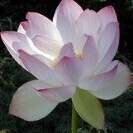-
Posts
934 -
Joined
-
Days Won
1
Content Type
Profiles
Forums
Events
Store
Downloads
Gallery
Everything posted by Franco
-
You might to want to check with Danny Massey .... https://www.nihontocraft.com/japanese_sword_for_sale.html
-

Assistance on identifying or Translating Please
Franco replied to Sunseeker's topic in Translation Assistance
The blade itself, ko-gatana, is made of kawagane or skin steel (see links below). Suggest keeping the ko-gatana lightly oiled, especially the rusty area where it inserts into the kozuka to prevent the rust there from continuing. Search this message board for threads on sword care. No silver polish! https://en.wikipedia.org/wiki/Shakudō https://www.martialartswords.com/blogs/articles/shingane-vs-kawagane-steel-whats-the-difference https://studyingjapaneseswords.com/tag/kawagane/ -
Not that I know of. Brian attends most if not all the sword shows here in the U.S. , if you would prefer to meet with him in person.
-
Brian Tschernega - professional cleaning / restoration (425) 771-6339 .
-
"Fine detail", hmm. Seriously, I see nothing that I would call fine detail. Everything has a mechanical look and feel to it.
-
1. Buy books. There are plenty of threads about which books to buy (use NMB search). Markus Sesko has translated a great deal of info, take advantage. 2. Study Japanese-nihonto history. A must for any serious collector. 3. Write out and ID your collecting objectives. What makes a sword collectible? What is kantei? According to Sato sensei what is the 2nd step in kantei? 4. Join study groups. Attend sword shows. Meet dealers. 5. "Don't mistake temptation for opportunity" Good luck.
-
Base looks like typical copper that was foiled over. Yes, needs careful cleaning.
-
Thoughts have turned to a feather like feature of underwater plants that perhaps filter feed? Crinoids, also known as feather stars or sea lilies, maybe? Wondering if the bird depicts a Chidori, which would hint towards an underwater sea plant?
-
Definitely a fern I would say. Exactly which kind you'll have to figure out.
-
Thank you, Curran. I was told by Brian Tschernega that the shirasaya pictured below is an "early" Edo period saya, and that the habaki was a later Edo period piece.
-
Truthfully, I'm not exactly sure what to classify this activity as, maybe an utsuri??? Almost certainly it will have a name, be categorized. Shirake utsuri, hmm. Shirake utsuri when seen is white, not like this. Muneyaki, no. Muneyaki first of all runs along and or borders the mune, not below the shinogi. There are two forms of muneyaki seen. One is more like a tobiyaki (considered inferior). The other is more like a yubashiri (superior). https://markussesko.com/2015/05/14/kantei-2-jigane-jihada-3/ https://markussesko.com/2015/05/29/kantei-3-hamon-boshi-1/
-
Citation required.
-
No worries. The point here of recommending a professional like Brian is that these pieces show significant age and quality. As such, repairs and restoration work as well should be undetectable. Some work (such as cleaning) can be accomplished at home, especially by someone with knowledge and experience.
-
Beginners luck! For cleaning and any restoration work I would suggest contacting/consulting Brian Tschernega 425.771.6339 . Both pieces are worn for good reason.
-
Who's talking about "for profit" ? "Don't buy junk!"
-
Another thing to keep in mind is that during this period of time at the end of Nambokucho and beginning of Muromachi, there were schools that were copying characteristics of other traditions. So, it isn't surprising to see an Echizen Rai sword with Yamato "like" characteristics. If that appeals to someone, fine. However, as a collector, when buying a Rai sword it might be preferable that it had strong Rai traits.
-
"Don't mistake temptation for opportunity"
-
Things to consider that jump out at me; 1) likely to be early Muromachi 2) Hamon is somewhat lacking for Rai, imo, especially compared to earlier first generation work. 3) Koshirae does not impress.
-
Dear Nazar, Love the kitty! Not to be evasive. Well, maybe just a little. My focus has been on old swords for so long that I've forgotten most of what I once knew about military swords. Asking and receiving thoughts from the military sword collectors would be more of value and accurate I should think. Please don't be discouraged. Take what you learn from this experience and use it to move forward. The best advice for any Japanese sword collector is to follow what the Japanese advise. Which is take the time to study and look at the very best swords possible. Train your eyes. Best,
-
Dear Nazar, Sorry to disappoint but I'm not seeing nioi. Only some form of treatment to make it appear so to untrained eyes.
-
How is this tsuba being restored, methods?
-

Interesting hamon pattern or NOT?
Franco replied to RichardY's topic in General Nihonto Related Discussion
Looks like sunagashi. One problem here is that things could look substantially different in new polish. This polish does this sword no favor. -

What could have happened to this kissaki?
Franco replied to Rokkit's topic in General Nihonto Related Discussion
1). Steel looks lifeless = has to be examined for heat exposure. 2). Might also have been cleaned using 'nevr dull' . Which while it will do no harm when used properly removing dirt, grime, and rust, it will dull the finish and look of the steel. Personally, suspect the former. -
A blade worthy of attention.






